What is Climate Change? Climate Change refers to the long-term shifts in temperatures and weather patterns of the Earth's climate system. These shifts are primarily driven by human activities, particularly the burning of fossil fuels, which release greenhouse gases into the atmosphere. These greenhouse gases trap heat, leading to a rise in global temperatures, and in turn, triggering a chain of significant impacts on Earth's ecosystems and human societies.
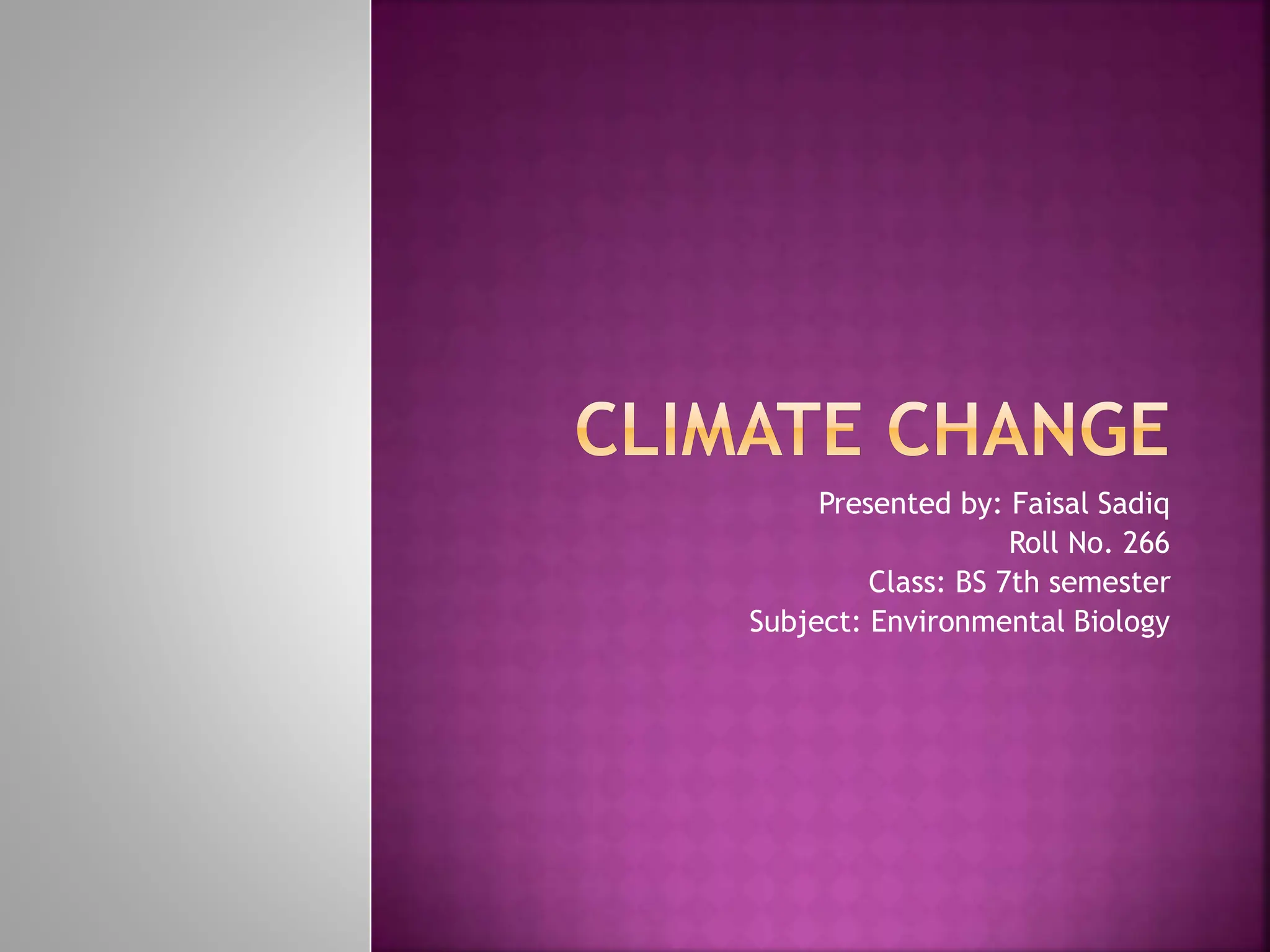
Climate change , causes, impacts and solutions.pptx - Source www.slideshare.net
Editor's Notes: Climate Change: Causes, Impacts, and Solutions published 22nd April, 2023. Given the urgent need to address the challenges posed by climate change, this topic holds paramount importance. Its far-reaching consequences necessitate informed understanding, effective mitigation strategies, and collective action to safeguard our planet and ensure a sustainable future.
To help our readers better grasp the complexities of climate change, we have conducted extensive research, analyzed data, and consulted experts in the field. This comprehensive guide provides a detailed exploration of the causes, impacts, and potential solutions to this pressing global issue.
Key Differences: Climate Change vs. Global Warming
| Aspect | Climate Change | Global Warming |
|---|---|---|
| Definition | Long-term shifts in Earth's climate system influenced by human activities | Increase in Earth's average temperature due to greenhouse gas emissions |
| Scope | Encompasses global warming, as well as changes in precipitation patterns, sea levels, and other climate variables | Specifically refers to the rise in global temperatures |
| Causes | Primarily human activities (e.g., burning fossil fuels, deforestation) | Primarily greenhouse gas emissions (e.g., carbon dioxide, methane) |
Main Article Topics:
FAQ
This section provides answers to frequently asked questions about climate change, its causes, impacts, and potential solutions.
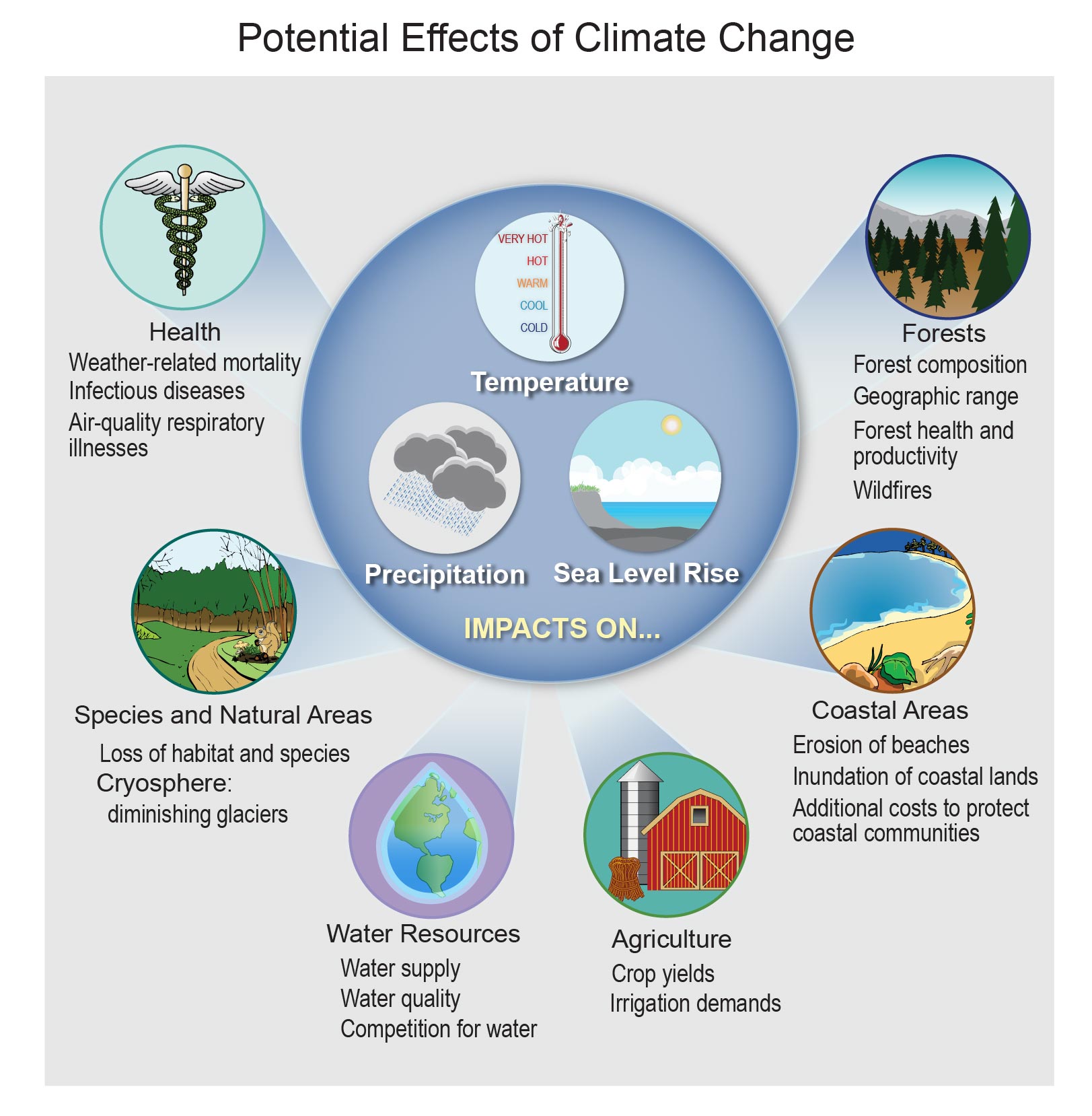
Potential Effects of Climate Change | National Climate Assessment - Source nca2014.globalchange.gov
Question 1: What is climate change?
Climate change refers to long-term shifts in global or regional climate patterns, primarily driven by human activities that increase greenhouse gas emissions. These emissions alter the energy balance of the Earth's atmosphere, leading to changes in temperature, precipitation, wind patterns, and other climate variables.
Question 2: What are the main causes of climate change?
The primary cause of climate change is the burning of fossil fuels (coal, oil, and natural gas) for energy, which releases carbon dioxide and other greenhouse gases into the atmosphere. Other human activities that contribute to climate change include deforestation (particularly in tropical regions), industrial processes that emit greenhouse gases, and certain agricultural practices.
Question 3: What are the potential impacts of climate change?
Climate change can have widespread and severe impacts, including: rising sea levels and coastal erosion; more intense and frequent extreme weather events (e.g., hurricanes, heatwaves, droughts); changes in precipitation patterns that can lead to water scarcity or flooding; disruptions to ecosystems and biodiversity; and increased risk of human health issues related to air pollution and heat stress.
Question 4: What can be done to mitigate climate change?
Mitigating climate change involves taking steps to reduce greenhouse gas emissions. This can include transitioning to renewable energy sources (e.g., solar and wind power), improving energy efficiency in buildings and transportation, reducing deforestation and promoting reforestation, and adopting sustainable agricultural practices.
Question 5: What are the potential solutions to the impacts of climate change?
Adapting to the impacts of climate change involves taking measures to minimize vulnerabilities and strengthen resilience. This can include building sea walls and other infrastructure to protect against coastal erosion, enhancing early warning systems for extreme weather events, developing drought-tolerant crops, and investing in healthcare infrastructure to address heat-related illnesses.
Question 6: What can individuals do to make a difference in addressing climate change?
Individuals can make significant contributions by adopting more sustainable lifestyles, such as reducing their energy consumption, using public transportation or carpooling, conserving water, and reducing waste production. They can also advocate for climate action by supporting policies that promote clean energy, emissions reductions, and adaptation measures.
Addressing climate change requires a collective effort involving governments, businesses, scientific communities, and individuals worldwide. By understanding the causes, impacts, and potential solutions to climate change, we can work together to create a sustainable and resilient future for our planet.
Next: Climate Change Resources
Tips
Mitigating the impacts of climate change demands conscious efforts at both individual and collective levels. By adopting sustainable practices and advocating for policy changes, we can make a meaningful difference. Here are key tips to consider:
Climate Change: Causes, Impacts, And Solutions\
Reduce Carbon Footprint:
- Drive less and opt for public transportation, walking, or cycling.
- Conserve energy at home by using efficient appliances and turning off lights when not in use.
- Switch to renewable energy sources, such as solar panels or wind turbines.
Conserve Water:
- Install low-flow fixtures in faucets and showers.
- Water your lawn less frequently and use native plants that require less watering.
- Fix leaks promptly to prevent water wastage.
Reduce Waste:
- Reduce, reuse, and recycle to minimize landfills and waste pollution.
- Use reusable shopping bags, water bottles, and lunch containers.
- Buy less and mend or donate items instead of discarding them.
Support Sustainable Businesses:
- Patronize companies with strong environmental practices.
- Buy local produce to reduce transportation emissions.
- Choose ethical and eco-friendly products and services.
Advocate for Policy Changes:
- Contact your elected officials and urge them to support climate action.
- Participate in public consultations and advocate for policies that promote renewable energy, energy efficiency, and waste reduction.
- Support organizations working on climate change mitigation and adaptation.
Raise Awareness:
- Educate yourself about climate change and its impacts.
- Share information with others and encourage them to adopt sustainable practices.
- Participate in community initiatives and workshops related to climate change.
By implementing these tips, we can contribute to mitigating climate change, preserving our planet for future generations, and ensuring a healthy and sustainable future for all.
Climate change, the result of our planet gradually warming over many years, altering weather patterns around the world, has emerged as one of the most pressing issues of our time.

Climate Change | World101 - Source world101.cfr.org
Editor's Notes: The report on "Climate Change: Causes, Impacts, And Solutions" has been published today date. Given the urgency of the topic, we believe it is essential reading for anyone concerned about the future of our planet.
Our team has spent months analyzing the latest scientific research and interviewing experts in the field to put together this comprehensive guide to climate change.
Key takeaways:
| Title | Points |
|---|---|
| Causes of climate change | Greenhouse gases from the burning of fossil fuels, deforestation, among others |
| Impacts of climate change | Rising sea levels, more extreme weather events, changes in plant and animal life |
| Solutions to climate change | Reducing emissions, investing in renewable energy, promoting sustainable practices |
Transition to main article topics
FAQ
This FAQ section provides concise answers to common questions about climate change, its causes, impacts, and potential solutions.
Question 1: What are the main causes of climate change?
The primary cause of climate change is the emission of greenhouse gases into the atmosphere, primarily from human activities such as burning fossil fuels (coal, oil, and gas) for energy, transportation, and industrial processes. These gases trap heat and lead to a gradual warming of the planet.

Climate Change - Source fity.club
Question 2: What are the impacts of climate change?
Climate change has widespread impacts, including rising sea levels, more frequent and intense heatwaves, droughts, and floods, as well as changes in plant and animal life. These impacts can have significant consequences for human health, infrastructure, food security, and ecosystems.
Question 3: Is climate change irreversible?
While some effects of climate change are already irreversible, such as sea level rise, many impacts can be mitigated by reducing greenhouse gas emissions. Transitioning to renewable energy sources, implementing energy efficiency measures, and adopting sustainable land-use practices is crucial for limiting the extent of future climate change.
Question 4: What can I do to help?
Reducing your carbon footprint by making changes in your lifestyle can make a difference. Conserving energy at home and at work, using public transportation or walking instead of driving, and supporting businesses that prioritize sustainability can all contribute to mitigating climate change.
Question 5: What are the potential solutions to climate change?
Addressing climate change requires a multifaceted approach, including transitioning to renewable energy sources, improving energy efficiency, and implementing carbon capture and storage technologies. Additionally, promoting sustainable land-use practices, such as reforestation and conservation, can help mitigate greenhouse gas emissions.
Question 6: What is the role of international cooperation?
Addressing climate change effectively requires global collaboration. International agreements, such as the Paris Agreement, are essential for coordinating efforts to reduce greenhouse gas emissions and promote sustainable development.
Reducing our reliance on fossil fuels, embracing renewable energy sources, and promoting sustainable practices are paramount in mitigating climate change and safeguarding our planet for future generations.
Next Article:
Tips for Addressing Climate Change
Climate change poses an unprecedented threat to our planet. Tackling this challenge requires a collective effort and individual actions. Consider these tips to contribute to climate change mitigation and address its impacts.
Tip 1: Reduce carbon footprint: Transition to renewable energy sources like solar and wind, and opt for energy-efficient appliances. Encourage public transportation, biking, or walking instead of driving.
Tip 2: Support sustainable practices: Choose products made with recycled materials, reduce plastic consumption, and promote sustainable agriculture. Engage in community initiatives for tree planting and waste reduction.
Tip 3: Conserve water: Implement water-saving fixtures, collect rainwater, and practice responsible irrigation. Reduce water consumption in daily activities like showering and washing clothes.
Tip 4: Advocate for policy change: Contact elected officials and support initiatives that promote clean energy, carbon pricing, and climate-resilient infrastructure. Encourage government action on climate change.
Tip 5: Educate yourself and others: Stay informed about climate science, impacts, and solutions. Share knowledge and foster conversations about the urgency of climate action.
Climate change mitigation and adaptation require a multifaceted approach. By incorporating these tips into our daily lives and advocating for change, we can play a crucial role in safeguarding our planet's future.
To delve deeper into the causes, impacts, and solutions related to climate change, refer to the comprehensive resource: Climate Change: Causes, Impacts, And Solutions.
Climate Change: Causes, Impacts, And Solutions
Addressing climate change demands a thorough understanding of its causes, impacts, and potential solutions. This involves exploring various dimensions, including human activities, environmental consequences, and mitigation strategies.
- Anthropogenic Emissions: Human activities, such as burning fossil fuels, contribute to greenhouse gas emissions.
- Global Warming: Rising greenhouse gas levels trap heat, leading to increased global temperatures.
- Extreme Weather Events: Climate change intensifies extreme events, including heat waves, droughts, and hurricanes.
- Sea Level Rise: As glaciers and ice caps melt, sea levels rise, threatening coastal communities and ecosystems.
- Ecosystem Disruption: Climate change alters habitats and affects biodiversity, disrupting ecological balance.
- Mitigation Strategies: Implementing renewable energy sources, promoting energy efficiency, and restoring forests can mitigate climate change impacts.
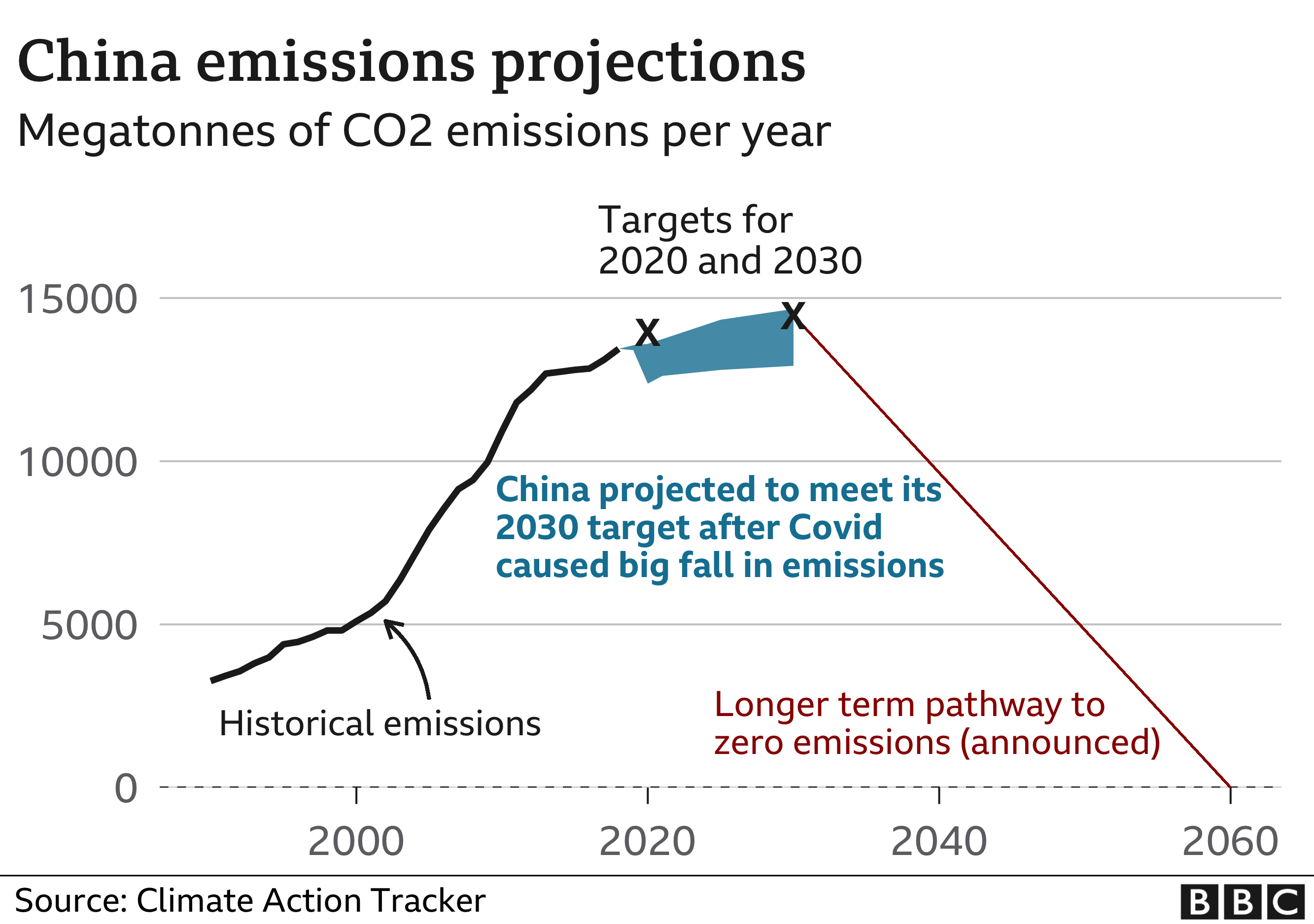
Climate Change Predictions For 2024 - Cynthy Mariejeanne - Source calidabsilvie.pages.dev
In a world facing the consequences of climate change, these key aspects provide a framework for understanding the multifaceted nature of this critical issue. From human influences to environmental disruptions, and from mitigation efforts to sustainable practices, this comprehensive analysis equips us with the knowledge needed to address climate change effectively.
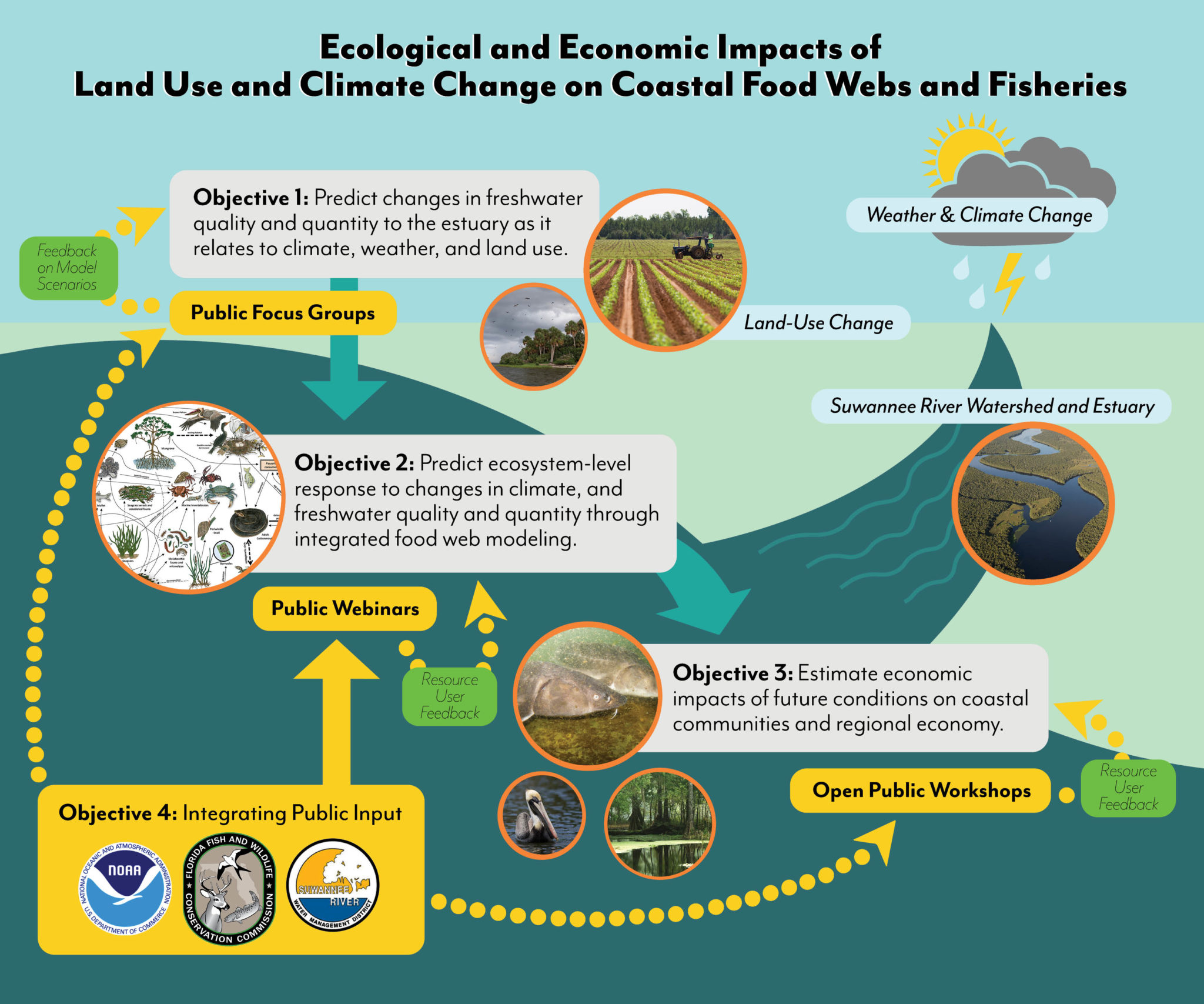
Ecological and Economic Impacts of Land Use and Climate Change on - Source waterinstitute.ufl.edu
Climate Change: Causes, Impacts, And Solutions
Climate change encompasses a complex array of interrelated causes, impacts, and potential solutions. It is an urgent and multifaceted issue requiring collective action and comprehensive understanding. Climate change, primarily driven by human activities, poses significant threats to environmental, social, and economic systems globally.
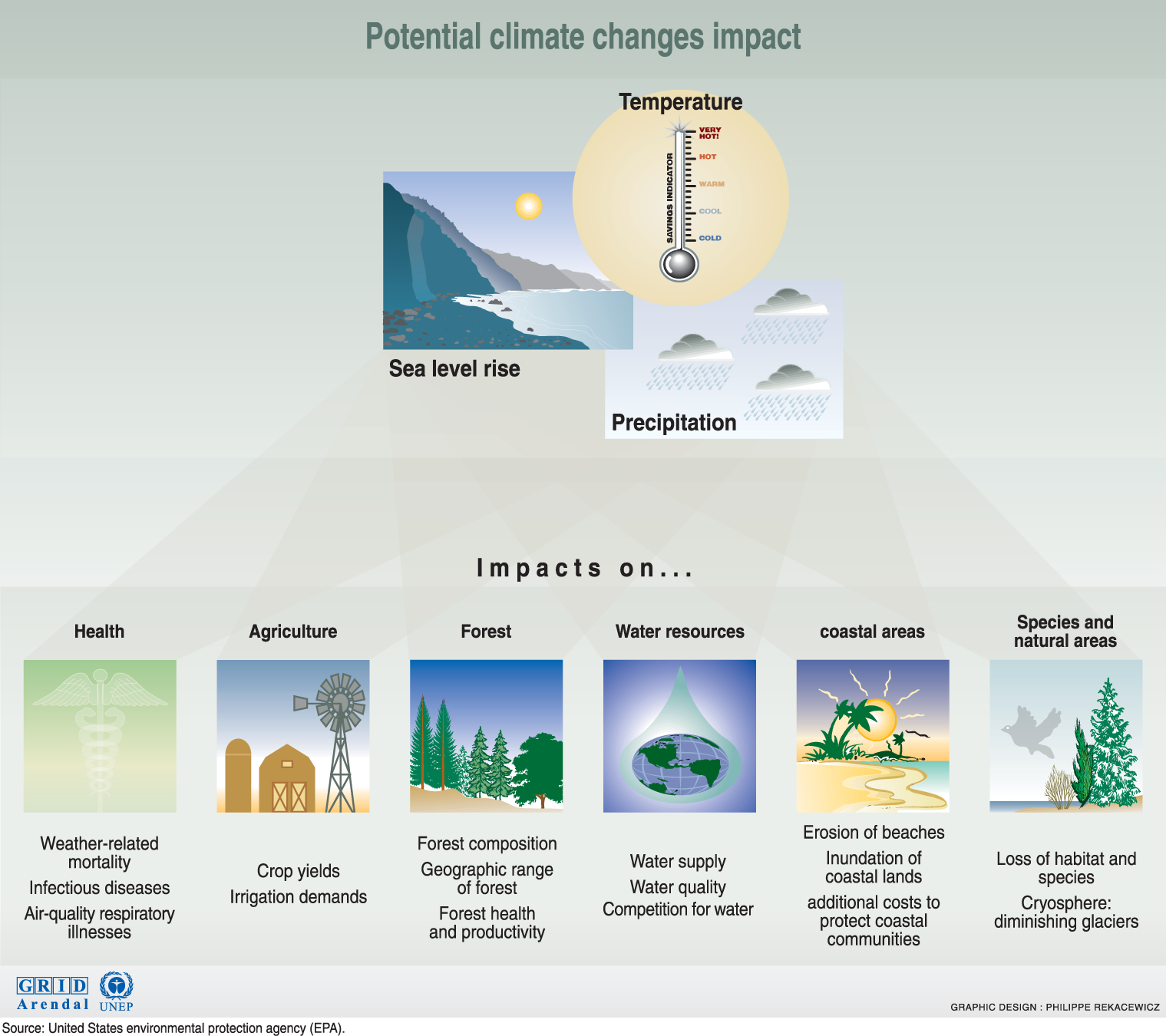
Climate Change: Consequences and Repercussions — Beyond Weather & The - Source beyondweather.ehe.osu.edu
Addressing climate change demands a holistic approach that tackles its underlying causes, mitigates adverse impacts, and promotes sustainable solutions. Mitigation strategies aim to reduce greenhouse gas emissions through transitioning to renewable energy, improving energy efficiency, and implementing sustainable land-use practices. Adaptation measures focus on enhancing resilience to climate change impacts, such as building seawalls to protect against rising sea levels or developing drought-resistant crops.
Recognizing the interconnected nature of climate change requires a concerted global effort. International agreements, such as the Paris Agreement, provide a framework for collaboration and emission reduction commitments. National and local governments also play a crucial role in implementing emission reduction programs and supporting adaptation measures. Additionally, individual actions, such as reducing carbon footprints and advocating for climate policies, contribute to addressing this pressing issue.
| Cause | Impact | Solution |
|---|---|---|
| Greenhouse gas emissions | Rising temperatures, melting polar ice caps | Shifting to renewable energy, conserving energy |
| Deforestation | Loss of biodiversity, increased carbon dioxide levels | Sustainable forestry practices, reforestation |
| Agricultural practices | Soil degradation, methane emissions | Sustainable farming, reducing fertilizer use |
Conclusion
Addressing climate change requires a comprehensive approach that tackles both its causes and impacts. Mitigation strategies, adaptation measures, and international cooperation are essential elements in combating this global challenge. Recognizing the interconnectedness of environmental, social, and economic systems, tackling climate change demands collective action from individuals, communities, and governments to ensure a sustainable future.
The time for complacency has passed; decisive action is paramount. Embracing innovative solutions, promoting sustainable practices, and advocating for climate policies are critical steps we must take collectively to protect our planet and safeguard the well-being of current and future generations.